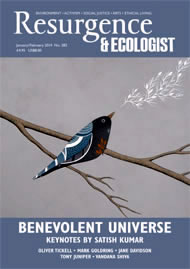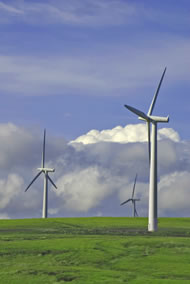Our relationship with energy presents big challenges, not only for our technology, but also for our culture, society and democracy. Paul Allen explores this relationship and where it went wrong
The story of humanity’s relationship with energy began over 400 million years ago with the formation of fossil fuels. Basking in the sun for millions of years, the Earth soaked up energy through photosynthesis – creating the largest, most concentrated and most convenient ‘energy deposit account’ we are ever likely to know.
However, for the first few thousand years of our civilisation, humanity had no idea that this energy deposit was under our feet. Our access to energy was limited to the ‘annual ration’ of sunlight that reached the Earth’s surface. We lived with the seasons, with a range of natural relationships based around the soil, as the only ways to convert incoming sunlight into the things we needed. Over centuries, humanity became more inventive, utilising wood and canvas to drive sailing ships, windmills and waterwheels – but we were still driven by our annual solar ration.
The discovery of fossil fuels changed everything. By the early 20th century, an ever-growing access to massive reserves of ancient solar energy fed rapidly expanding industries, so economic systems were built on the assumption that growth is the norm.
Fossil fuel production was highly profitable, and much of our infrastructure was designed, on purpose, to use as much as possible. Although the practice of highlighting one’s standing in society by consuming more than one needs is as old as civilisation itself, fossil fuels allowed this elitist habit to become ingrained in mass culture.
Abundant cheap fossil fuels had by now pervaded almost every aspect of our lives – and in the process fractured many of our long-cherished relations with natural systems. On any historical or geographical comparison, the amount of energy we each now use in the West is highly abnormal, but has been normalised. A generation has grown up assuming the lights will always come on, there will be petrol at the pumps and stocked shelves in the supermarket, and we will have more fun and greater success if we buy more, eat more, travel more and spend more.
So in order to move forward we must try to understand the psychology of our current collective addiction to fossil fuels and explore how we were so gladly driven into these habits.
Access to all this abundant ancient sunlight has brought us into spectacular times. On one hand we have the incredible advances of medicine, science, education and entertainment. But conversely, we must now live with, or bury, the pain of the destruction, exploitation and capitalisation of our natural spaces and the people who inhabit them.
Living with this paradox from day to day is a problem that seriously affects our wellbeing. And although it has become a highly pervasive source of anxiety, society has created deeply ingrained taboos against the public expression of this anguish, leaving many paralysed and sleepwalking through the shopping malls. We put it in that locker – just out of conscious thought – where, for example, smokers store their knowledge about lung cancer.
However, in recent decades this build-up of collective anxiety has transformed the way contemporary culture portrays our future: from an exciting new world of progress to one of darkness and uncertainty. Whenever we look 10 or 20 years ahead, we see ecological collapse: from Children of Men, The Road and 28 Days Later to World War Z, the list of doom-and-gloom stories seems endless, and has ensured that a whole new generation is growing up with this gloom-laden vision.
Yet if people can’t imagine a positive future, how will they create it? The Zero Carbon Britain project has been developed to help us to think differently. The most recent report, Rethinking the Future, offers robust, evidence-based scenarios, with the goal of opening new conversations, stimulating research and building consensus. By linking up smart approaches to food production, diet, buildings, transport, energy and land use, it shows how the UK’s greenhouse-gas emissions can be reduced to net zero by 2030, using only existing technology while maintaining a modern lifestyle.
But such a rapid decarbonisation is currently beyond the boundaries of what is ‘politically thinkable’, and is therefore every bit as much a challenge for our society and democracy as for our technology. Physically, we could transform very rapidly but it needs to be driven by a cultural shift. We must, therefore, integrate our arts, science and politics into a single discipline: science tells us things, but it is art that can help us really take those things on board.
With the 1950s fossil-fuelled ‘American Dream’ still quietly rippling out through the global subconscious, the arts offer an urgently needed mirror to reflect the incredible story of humans and energy, and how this defines the way we see ourselves, each other and our relationships with the natural world.
We must, of course, acknowledge that fossil fuels have enabled a fantastic transformation: fuelling the embryo of human society, much like the yolk of an egg fuels the development of the chick. But we know fossil fuels cannot go on forever, as burning them releases the massive amounts of carbon dioxide locked away when they were formed, and the peaking of conventional oil and gas supplies will also cause increasing turmoil in the economies and societies that still depend heavily on them.
The next chapter of the story of humans and energy must begin now. Although methods such as fracking are presented as sources of secure, affordable energy, in fact investing in more fossil fuel infrastructure tightens the grip of a very serious and expensive threat. As long as banks underwrite deals taking us further away from the right climate choices, they continue to drive the powerful lobbying groups that work to prevent change. But by valuing our massive, global, renewable energy asset, we can find the courage and ingenuity to transform oil, coal and gas interests – and so harness “the last rations of fossil fuels that can be safely burned” to hatch humanity into the sunlight and return us to living on our annual energy ration.
Our tools are no longer limited to soil, canvas and wood; we now have an incredible array of technologies that can capture enough energy from our annual sunlight ration to more than meet our global needs.
The conclusion of the story of humans and energy is still unwritten; it depends on which complex system shifts first – the human ‘techno-cultural-economic’ systems, or the Earth’s ‘geo-biological-climatic’ systems.
What has become clear is that our 21st-century challenges can no longer be met with a 20th-century approach, including how we think about the future! We need now to visualise what it would be like to live and love in a world where we have risen to those challenges, restored our relationships with Nature, and transformed our anguish into empowerment. As we make changes in culture, technology and lifestyle we begin to glimpse a truly sustainable future, dappled here in the present. Replicable beacons begin to multiply, offering a glimpse of another chapter in the incredible story of humans and energy.







